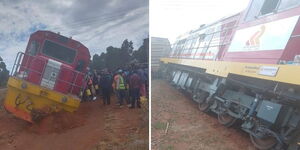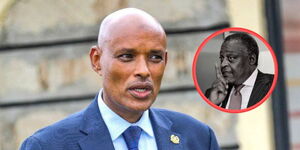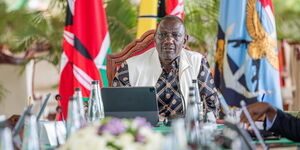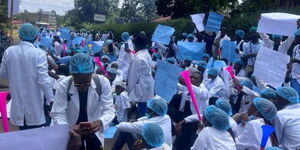Kenyans have raised concerns over the government's handling of burials during the Covid-19 pandemic.
Several families now claim that they were made to pay fees to public health staff in full PPEs for burials, despite not being made aware that their kin had died of the virus.
Even in the case of Covid-19 infected bodies, local health authorities are responsible for deploying teams in line with disposal protocols once notified of the death. Families are, however, allegedly being forced to pay up to Ksh13,000 for the burials to be facilitated.
In a recent case, an Eldoret-based photographer died after he was run over by a car near the main stage. Ahead of the burial, however, local health staff informed the family that they had to pay them to attend the burial in PPEs and undertake the disposal. Knowing that their kin died in a road accident, the family questioned the demand as no positive posthumous Covid-19 test result was shared with them.
In another case in Embu County, a family also had to pay a local public health team for the burial despite their insistence that their kin died of Cancer.
The situation has led many Kenyans, including on social media, to raise doubts over the infection, recovery and fatality figures announced by the Ministry of Health at daily briefings on the pandemic.
Efforts by Kenyans.co.ke to draw a response from Health Chief Administrative Secretary (CAS) Mercy Mwangangi and Director-General Patrick Amoth were futile as they were yet to respond by the time of publication.
According to multiple scientific journals, transmission of Covid-19 by a dead body is technically possible although it is less likely as the virus is primarily spread through respiratory droplets when people cough, sneeze or talk.
Guidelines issued by the Ministry of Health at the onset of the pandemic saw stringent measures put in place to ensure safe disposal of bodies infected with the virus.
A number of cases of posthumous positive Covid-19 test results have been confirmed in Kenya; including a Kenya Ports Authority (KPA) worker in April and the Bondo police boss (OCPD) in July.
According to the guidelines, once a death is reported at the community level, the family or the community must notify the nearest health service delivery point immediately, who then notify the county disease surveillance department.
The information is then relayed to the Ministry of Health disaster emergency response operation center under the Director General’s office. The regional pathologist will be notified by the county surveillance department.
Health workers must apply strict standard precautions while handling the body, including hand hygiene and use of PPEs. Bodies are also to be put in leak-proof and tamper-proof body bags.
The disposal of human remains from COVID-19 cases should be overseen by a public health official within 2 days (48 hours) to avoid community practices that would result in more infections through contact.
The guidelines further note that local health authorities should designate a team to oversee the process of human remains disposal in case of Coronavirus disease deaths.












